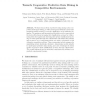Free Online Productivity Tools
i2Speak
i2Symbol
i2OCR
iTex2Img
iWeb2Print
iWeb2Shot
i2Type
iPdf2Split
iPdf2Merge
i2Bopomofo
i2Arabic
i2Style
i2Image
i2PDF
iLatex2Rtf
Sci2ools
120
Voted
ADMI
2009
Springer
2009
Springer
Towards Cooperative Predictive Data Mining in Competitive Environments
Abstract. We study the problem of predictive data mining in the competitive multi-agent setting, in which each agent is assumed to have some partial knowledge needed for correctly classifying a set of unlabelled examples. The agents are self-interested and therefore need to reason about the trade-offs between increasing their classification accuracy by collaborating with other agents and disclosing their private classification knowledge to other agents through such collaboration. We analyze the problem and propose a set of components which can enable cooperation in this otherwise competitive problem. These components include measures for quantifying private knowledge disclosure, data-mining models suitable for multi-agent predictive data mining, and a set of strategies by which agents can improve their classification accuracy through collaboration. The overall framework and its individual components are validated on a synthetic experimental domain.
ADMI 2009 | Classification Accuracy | Competitive Multi-agent Setting | Data Mining | Predictive Data Mining |
Related Content
| Added | 25 May 2010 |
| Updated | 25 May 2010 |
| Type | Conference |
| Year | 2009 |
| Where | ADMI |
| Authors | Viliam Lisý, Michal Jakob, Petr Benda, Stepán Urban, Michal Pechoucek |
Comments (0)

